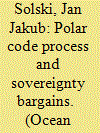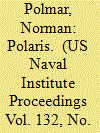| Srl | Item |
| 1 |
ID:
190648


|
|
|
|
|
| Summary/Abstract |
Owing to a shift from the culture of compliance to the culture of benchmarking, the Polar Code process of ensuring safe operation and environmental protection in Polar waters is still ongoing. The risk and goal-based approaches embedded in significant parts of the Polar Code invite different stakeholders to participate in the development of Arctic shipping governance. The methodology used in the process, such as POLARIS, may serve as a common baseline, but its utility relies on further updates and validation. The reliability of decision-support systems depends largely on whether different stakeholders embrace the system and share their experiences to facilitate systematic updates. This article compares the approaches of the two major coastal states, Canada and Russia, to POLARIS as reflected in their coastal state systems of shipping control in the Canadian Arctic Waters and the Russian Northern Sea Route (NSR). Considering that much Arctic shipping occurs within the Canadian Arctic and the NSR, their regulatory approaches may affect POLARIS’s popularity, acceptance, and, eventually, success in providing a common regulatory baseline.
|
|
|
|
|
|
|
|
|
|
|
|
|
|
|
|
| 2 |
ID:
071187


|
|
|
| 3 |
ID:
100671


|
|
|
|
|
| Publication |
2010.
|
| Summary/Abstract |
This article investigates the little-known plans formulated by Harold Wilson's Labour government to deploy Polaris submarines in the Indo-Pacific region. The scheme was first proposed in 1965 as a response to several problems faced by British policy-makers, including China's acquisition of a nuclear capability, Britain's wish to maintain a meaningful position 'East of Suez' at reduced cost, and German pressure for equal treatment within NATO on nuclear matters. Despite extensive high-level discussion, the plans were finally abandoned in mid-1968, as Labour moved more decisively to forsake the world role.
|
|
|
|
|
|
|
|
|
|
|
|
|
|
|
|